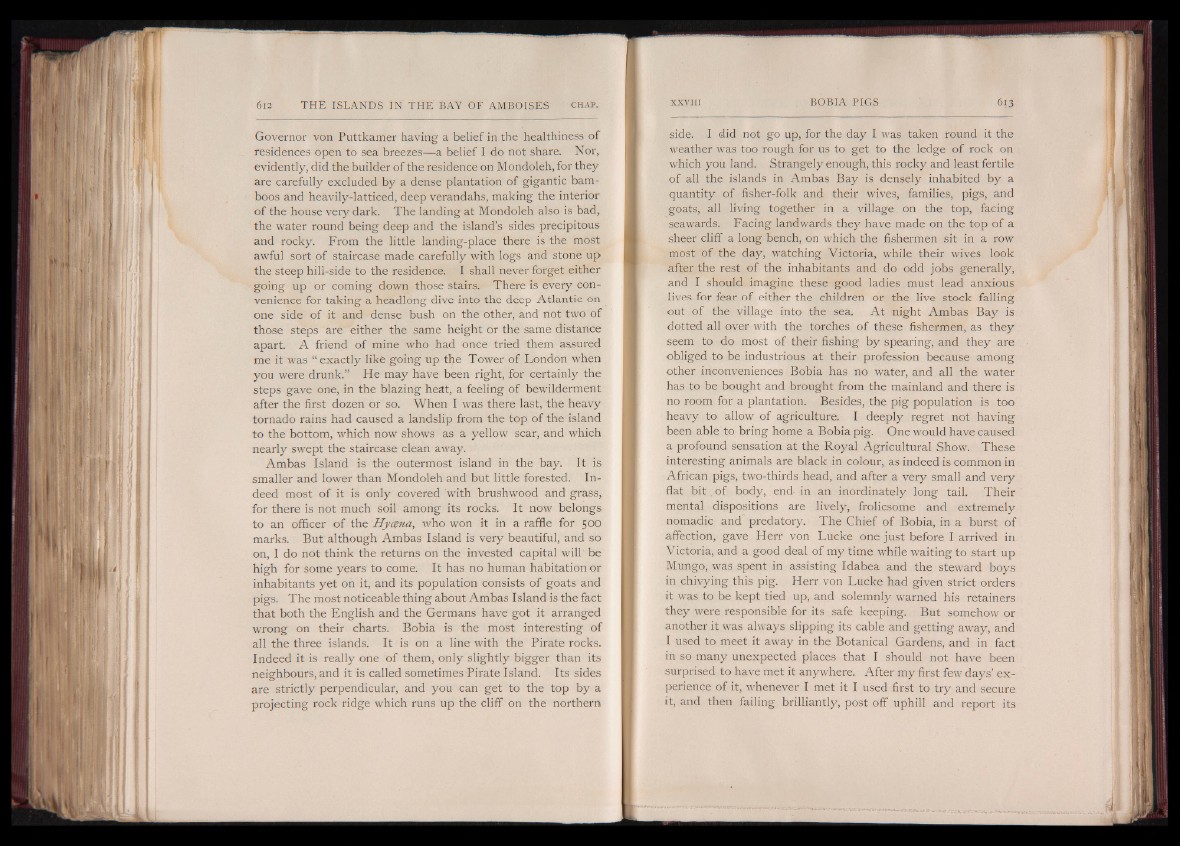
Governor von Puttkamer having a belief in the healthiness of
residences open to sea breezes— a belief I do not share. Nor,
evidently, did the builder of the residence on Mondoleh, for they
are carefully excluded by a dense plantation of gigantic bamboos
and heavily-latticed, deep verandahs, making the interior
of the house very dark. The landing at Mondoleh also is bad,
the water round being deep and the island’s sides precipitous
and rocky. From the little landing-place there is the most
awful sort of staircase made carefully with logs and stone up
the steep hill-side to the residence. I shall never forget either
going up or coming down those stairs. There is every convenience
for taking a headlong dive into the deep Atlantic on
one side of it and dense bush on the other, and not two of
those steps are either the same height or the same distance
apart. A friend of mine who had once tried them assured
me it was “ exactly like going up the Tower of London when
you were drunk.” He may have been right, for certainly the
steps gave one, in the blazing heat, a feeling of bewilderment
after the first dozen or so. When I was there last, the heavy
tornado rains had caused a landslip from the top of the island
to the bottom, which now shows as a yellow scar, and which
nearly swept the staircase clean away.
Ambas Island is the outermost island in the bay. It is
smaller and lower than Mondoleh and but little forested. Indeed
most of it is only covered with brushwood and grass,
for there is not much soil among its rocks. It now belongs
to an officer of the Hycgna, who won it in a raffle for 500
marks. But although Ambas Island is very beautiful, and so
on, I do not think the returns on the invested capital will be
high for some years to come. It has no human habitation or
inhabitants yet on it, and its population consists of goats and
pigs. The most noticeable thing about Ambas Island is the fact
that both the English and the Germans have got it arranged
wrong on their charts. Bobia is the most interesting of
all the three islands. It is on a line with the Pirate rocks.
Indeed it is really one of them, only slightly bigger than its
neighbours, and it is called sometimes Pirate Island. Its sides
are strictly perpendicular, and you can get to the top by a
projecting rock ridge which runs up the cliff on the northern
side. I did not go up, for the day I was taken round it the
weather was too rough for us to get to the ledge of rock on
which you land. Strangely enough, this rocky and least fertile
o f all the islands in Ambas Bay is densely inhabited by a
quantity of fisher-folk and their wives, families, pigs, and
goats, all living together in a village on the top, facing
seawards. Facing landwards they have made on the top of a
sheer cliff a long bench, on which the fishermen sit in a row
most of the day, watching Victoria, while their wives look
after the rest of the inhabitants and do odd jobs generally,
and I should imagine these good ladies must lead anxious
lives for fear of either the children or the live stock falling
out of the village into the sea. At night Ambas Bay is
dotted all over with the torches of these fishermen, as they
seem to do most of their fishing by spearing, and they are
obliged to be industrious at their profession because among
other inconveniences Bobia has no water, and all the water
has to be bought and brought from the mainland and there is
no room for a plantation. Besides, the pig population is too
heavy to allow of agriculture. I deeply regret not having
been able to bring home a Bobia pig. One would have caused
a profound sensation at the Royal Agricultural Show. These
interesting animals are black in colour, as indeed is common in
African pigs, two-thirds head, and after a very small and very
flat bit . of body, end in an inordinately long tail. Their
mental dispositions are lively, frolicsome and extremely
nomadic and predatory. The Chief of Bobia, in a burst of
affection, gave Herr von Lucke one just before I arrived in
Victoria, and a good deal of my time while waiting to start up
Mungo, was spent in assisting Idabea and the steward boys
in chivying this pig. Herr von Lucke had given strict orders
it was to be kept tied up, and solemnly warned his retainers
they were responsible for its safe keeping. But somehow or
another it was always slipping its cable and getting away, and
I used to meet it away in the Botanical Gardens, and in fact
in so many unexpected places that I should not have been
surprised to have met it anywhere. After my first few days’ experience
of it, whenever I met it I used first to try and secure
it, and then failing brilliantly, post off uphill and report its